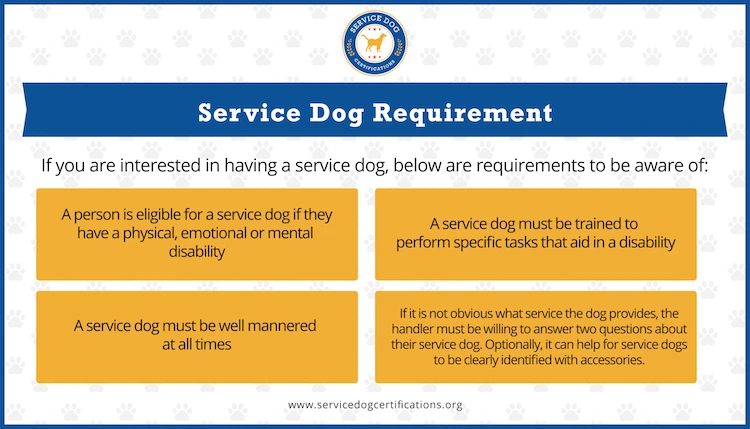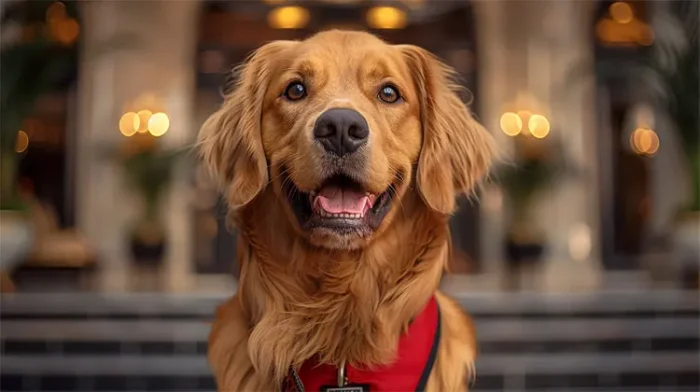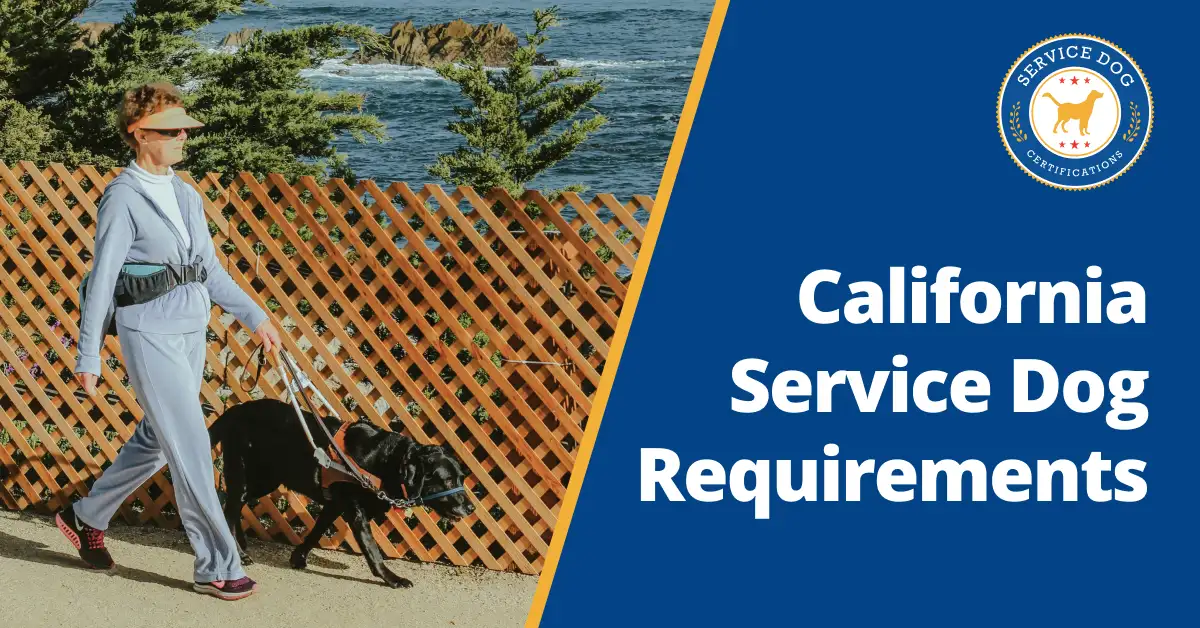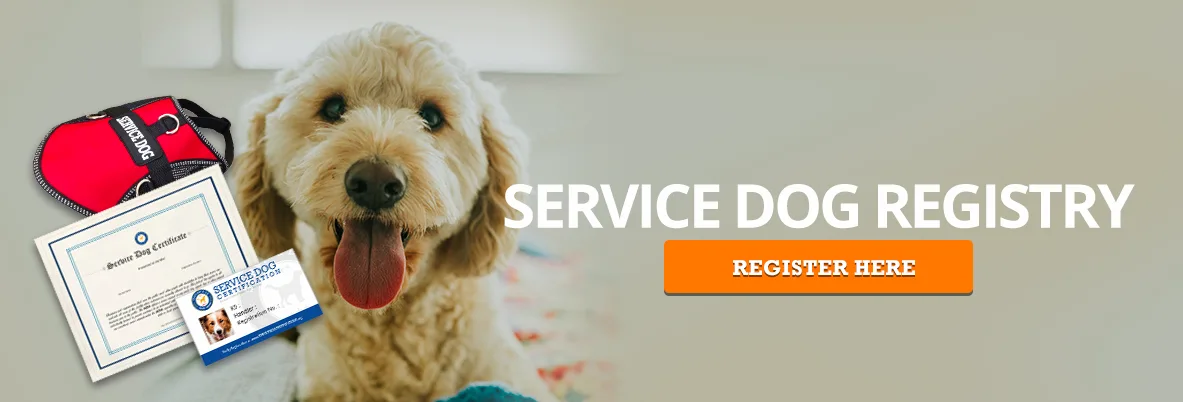Michigan Service Dog Requirements

Michigan warmly acknowledges the invaluable role service dogs play in supporting individuals with disabilities, ensuring their integration into public life is smooth and respectful.
The rights of service dog handlers in the Great Lakes State are well-protected under both federal and state law. In this guide, we’ll walk you through all of Michigan’s requirements for service dogs. We’ll also discuss Michigan’s voluntary ID program and a pivotal 2023 law expanding rights for service dogs in training.
Health and Eligibility Criteria
To qualify for a service dog in Michigan, an individual must have a physical or mental disability recognized under the ADA. The term “disability” means an impairment that substantially limits a life activity, like the ability to work, socialize, sleep, or learn. This encompasses a wide range of conditions, from mobility impairments and sensory disabilities to psychiatric conditions like anxiety, depression, and PTSD.
Service dogs that are used for mental health conditions are known as psychiatric service dogs and are as critical as their counterparts serving physical needs. If you’re unsure about whether you have an eligible mental health condition, a PSD letter might be an option for you.
Training Requirements
A distinctive feature of service dogs is their ability to perform tasks specifically related to their handler’s disability. Training can cover a spectrum of needs, from aiding navigation for those with visual impairments to offering touch support during panic attacks.
Michigan supports both professional and self-training routes. Many people prefer being involved in the training process to foster a deeper bond with the service dog.
Beyond performing specific tasks, service dogs must be well-behaved and under control in various public settings. This part of the training ensures the dog can accompany their handler safely and effectively without causing disruptions.
Fundamental commands such as sit, stay, come, down, and heel are crucial for a service dog’s behavior in public spaces. Service dogs must always be well-behaved and non-aggressive, regardless of the environment or situation. This includes not reacting to other animals, not seeking attention from the public, and not engaging in disruptive behaviors like barking, growling, or jumping on people.
A well-trained service dog should remain focused on its job through a variety of potentially distracting circumstances.
Service Dog Identification Requirements
While Michigan law does not require service dogs to wear identification, the state has implemented a voluntary ID program through the Michigan Department of Civil Rights. This initiative offers a practical way for handlers to identify their service dogs, simplifying access to public places and reducing potential conflicts or misunderstandings.
It’s important to note that this ID card, like all service dog ID cards, is completely optional. Establishments cannot deny a service handler just because they don’t have an ID card. These items are intended for immediate visual identification of service dogs and do not provide the animal or their handler any legal privileges or protections.
The Michigan Department of Civil Rights and the U.S. Department of Justice do not recognize service animal identification, whether provided by MDCR or any other organization, as proof that a particular dog is a service dog.

Service Dog Verification Requirements
In Michigan, when someone wants to bring their service animal into a place where pets usually aren’t allowed, and it’s not clear what the animal does to help with a disability, they can be asked two questions:
- Is this animal needed because of a disability?
- What specific task or job has the animal been trained to do?
The person with the service animal doesn’t have to tell anyone about their disability, show any ID for their animal, or demonstrate what the animal can do.
However, they do need to answer these questions well enough to show that their animal is not just a pet or a different kind of assistance animal. For instance, if someone says their animal helps them feel calmer, that’s not enough to prove it’s a service animal. They need to explain how the animal has been trained to help them, like if the animal is trained to take them to a safe place if they’re about to have a medical problem.
Registration Requirements
You are not required to register a service dog in Michigan. Registering a service dog to obtain an ID card is done voluntarily by service dog owners in Michigan and can have many benefits, but neither the ADA nor Michigan law mandates it.
Michigan Service Dog Privileges
In Michigan, service dogs are legally allowed to accompany their handlers in many public spaces where pets are not typically allowed. This accessibility extends to various locations, including but not limited to:
- Restaurants
- Stores
- Hospitals
- Educational institutions
- Hotels
Service dog handlers are entitled to these accommodations without any additional charges. However, handlers in Michigan need to know that they may be responsible if their service dog causes any property damage.

Housing Rights for Service Dog Owners in Michigan
Service dog owners in Michigan also enjoy specific housing rights. They are permitted to live with their service dogs in housing complexes, even those with no-pets policies. Service dogs are exempt from all weight and size restrictions.
Furthermore, landlords and housing complexes cannot impose pet fees or deposits specifically for accommodating a service dog. This ensures that individuals with disabilities can fully benefit from the support their service dogs provide without facing additional financial burdens.
Michigan Service Dog Air Travel Requirements
Service dogs must be allowed in airports and the cabin of planes without charge. When flying from or to Michigan with a service dog, handlers need to fill out the Department of Transportation’s Service Animal Air Transportation Form and submit it to their airline prior to boarding.
Rights for Service Dogs in Training
A significant development in Michigan’s commitment to service dog accessibility came in 2023, with a law granting service dogs in training the same public access rights as fully trained service dogs.
This ensures that service dogs in training can accompany their handlers or trainers in public spaces during their crucial training period, mirroring the access rights of full-trained service dogs.
Michigan Supports Service Dogs
Michigan’s legal framework actively protects the rights of service dog handlers. Violations against service dog rights are taken seriously, with resources available through the Michigan Department of Civil Rights for those facing discrimination or access issues.
About the Author: The writing team at Service Dog Certifications is made up of folks who really know their stuff when it comes to disability laws and assistance animals. Many of our writers and editors have service dogs themselves and share insights from their own experiences. All of us have a passion for disability rights and animals.
Related Articles

California Service Dog Requirements
In California, a service dog needs to be trained to perform at least one service dog task for a qualifying disability. If you meet those requirements, you can take your service dog almost anywhere with you throughout the Golden State. Californians are protected by both federal and state laws, including under the Americans with Disabilities […]

Read More

Texas Service Dog Laws
Individuals with disabilities whether they are physical or mental often feel isolated because it is harder for them to function in public; this is where service dogs come in. Service dogs provide individuals with disabilities the ability to have more freedom and go out in public without having to worry about what to do if […]

Read More

Colorado Service Dog Requirements
If you have a disability, you may qualify for a service dog. Colorado law aligns with federal guidelines. These guidelines allow a person with a disability to reside, travel, and perform their activities of daily living with a service dog. Colorado also takes the extra step to protect service dogs who are still in training […]

Read More


